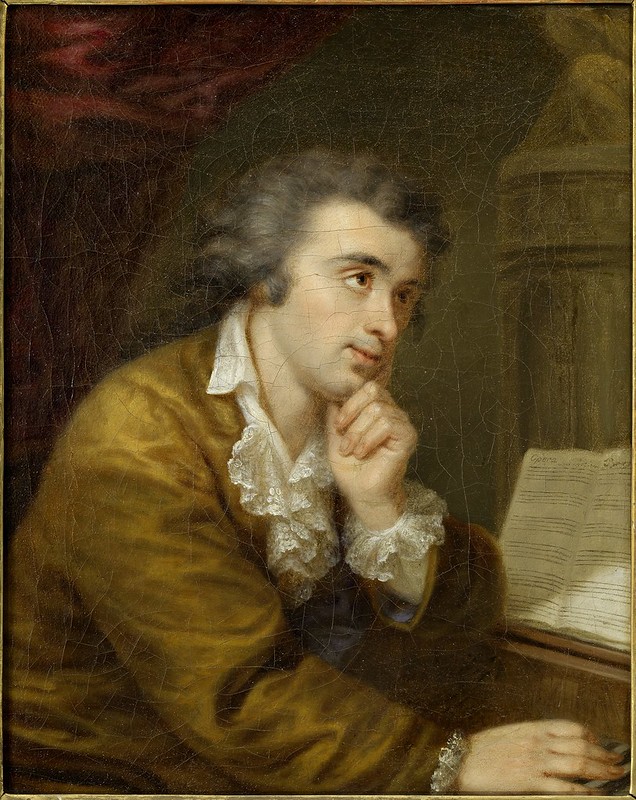Joseph Johann Baptist Wölfl (1773-1812)
- Sonata (in d) pour le piano-forte, Op.33 No.2 (1805)
Performers: Vladimir Pleshakov (piano)
Further info: Three Sonatas For Piano
---
Austrian pianist and composer. His earliest musical instruction was as a
chorister at Salzburg Cathedral from 1783 to 1786, where he studied
with Leopold Mozart and Michael Haydn. In 1790, on his father’s advice,
he went to Vienna, apparently to study with the younger Mozart, though
it is unclear whether he ever became his pupil and how close their
relationship actually was. Some authorities claim, however, that it was
through Mozart’s intervention that Wölfl was appointed composer to Count
Ogiński in Warsaw, where in 1792 he made his first public appearance as
a pianist. Having established a reputation both as a performer and a
teacher, Wölfl returned to Vienna in 1795, where his talents propelled
him to the forefront of public attention. He was soon regarded as the
only serious rival to Beethoven; indeed, the Allgemeine Musikalische
Zeitung preferred his ‘unpretentious, pleasant demeanour’ to Beethoven's
more emotionally charged style and praised him for playing that showed
‘not just a pleasing originality, but also a very rare combination of
power and delicacy’. In 1798 he married the singer Therese Klemm and the
following year embarked on a lengthy concert tour that took him to
Brno, Prague, Dresden, Leipzig, Hamburg, Berlin and Paris. He was well
received everywhere, but nowhere more so than Paris, where his welcome
was every bit as rapturous as that he had received in Vienna, with the
Journal de Paris describing him as ‘one of the most exciting pianists in
Europe’. In addition to his activities as a performer, Wölfl was also
establishing a reputation as a composer. His first opera, Der
Höllenberg, to a libretto by Schikaneder, was well received on its first
performance in Vienna in 1795, as was Der Kopf ohne Mann three years
later and the pasticcio Liebe machen kurzen Prozess.
In Vienna he also began to compose instrumental music in earnest,
dedicating his three piano trios op.5 to Haydn and his set of three
piano sonatas op.6 to Beethoven. These activities continued in Paris,
where in early 1804 his opera L’amour romanesque was performed to
considerable acclaim. The reasons for Wölfl's sudden departure from
Paris in 1805 are unclear. Some authorities ascribe it to the lukewarm
reception accorded his next opera, Fernando, though that seems unlikely
given the high regard in which he was otherwise held. What is almost
certainly true is that neither of two other popular explanations has any
basis in fact: either, as Fétis would have it, that he fell in with the
bass singer Ellenreich, who was a notorious card sharp and dragged
Wölfl into some unspecified scandal; or, according to Schilling, that he
became music master to the Empress Josephine, accompanied her to
Switzerland following her divorce, and thence made his way to England.
In May 1805 Wölfl arrived in London and immediately set about
establishing his reputation. He was enthusiastically fêted both as a
performer and as a composer. His G major Piano Concerto op.36 (known as
‘Le calme’) was especially popular and performed at four concerts within
the space of just two months; among his orchestral works, the G minor
Symphony op.40, which he dedicated to Cherubini, was highly regarded. As
in Paris, Wölfl tried to make his mark as an operatic composer, but
apart from two well-received ballets, given at the King's Theatre, he
failed to secure a commission. He died suddenly in May 1812, but for
almost two years there was speculation, fuelled in part by the
Allgemeine Musikalische Zeitung, that he was still alive.

Cap comentari:
Publica un comentari a l'entrada